Is .NET good for software development?
- June 29
- 17 min

.NET Core is a cutting-edge, open-source platform ideal for creating applications that run seamlessly on Windows, macOS, and Linux. Its flexibility caters to web apps, cloud services, desktop solutions, and microservices. This robust framework empowers developers to code once and deploy across various systems effortlessly.
Being open-source means .NET Core benefits from continuous enhancements by both Microsoft and the global developer community. Its modular architecture allows programmers to incorporate only necessary components, reducing app sizes and enhancing efficiency. Additionally, compatibility with Docker and Kubernetes makes it an excellent choice for cloud-based development.
It includes built-in support for ASP.NET Core as well as Entity Framework Core and integrates seamlessly with contemporary DevOps practices like CI/CD pipelines. The framework’s scalability makes it a preferred option for large-scale enterprise solutions. Moreover, its advanced just-in-time (JIT) compilation and sophisticated garbage collection techniques deliver superior runtime performance compared to older frameworks.
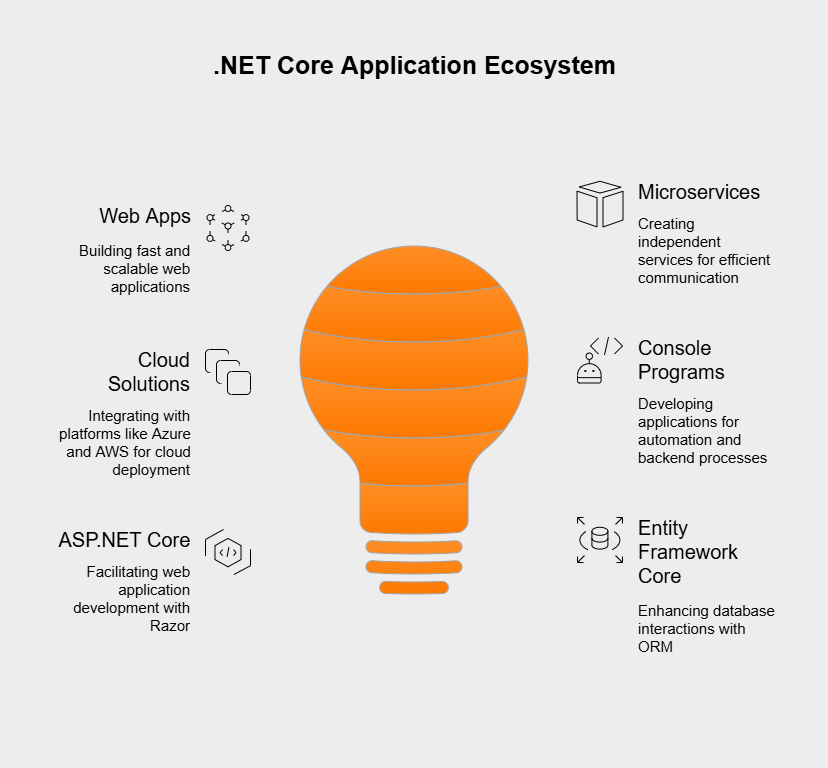
.NET Core stands out in the realm of modern app development due to several compelling features.
These capabilities make it particularly suitable for demanding tasks such as web services and cloud-based solutions.
The framework also maintains a predictable release cycle which includes long-term support (LTS) versions to ensure enterprise-level stability.
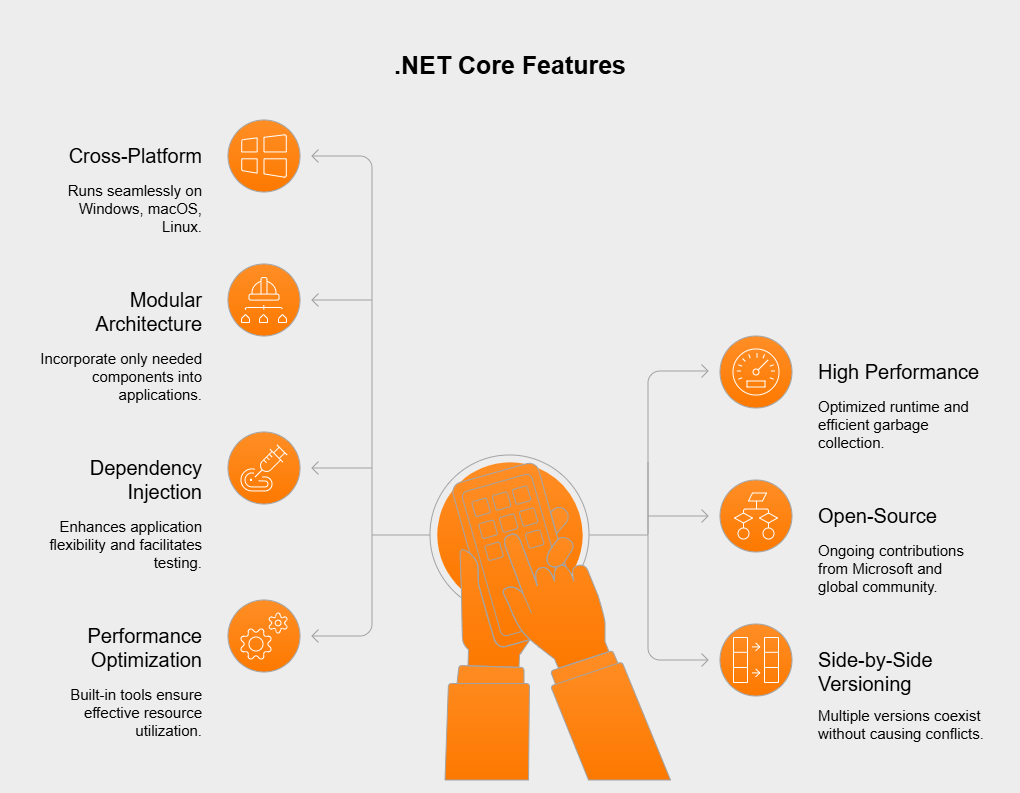
.NET Core empowers developers to create a diverse range of applications, such as web apps, microservices, cloud solutions, and console programs. With the help of ASP.NET Core, it’s possible to build fast and scalable web applications that function seamlessly across different platforms. Razor plays a crucial role in developing dynamic UI components for these web projects.
The lightweight framework and modular design of .NET Core are perfect fits for microservices architecture. This approach enables the creation of independent services that communicate effectively with one another. Furthermore, its compatibility with Docker containers facilitates smooth deployment in cloud environments.
Cloud-based applications thrive on .NET Core’s integration with modern platforms like Azure and AWS. The framework inherently supports scalable systems, making it an excellent choice for enterprise-level solutions.
Database interactions become more straightforward with Entity Framework Core serving as an object-relational mapper (ORM), enhancing both data access performance and flexibility. Console applications built on .NET Core are frequently used for automation tasks, system utilities, and backend processes.
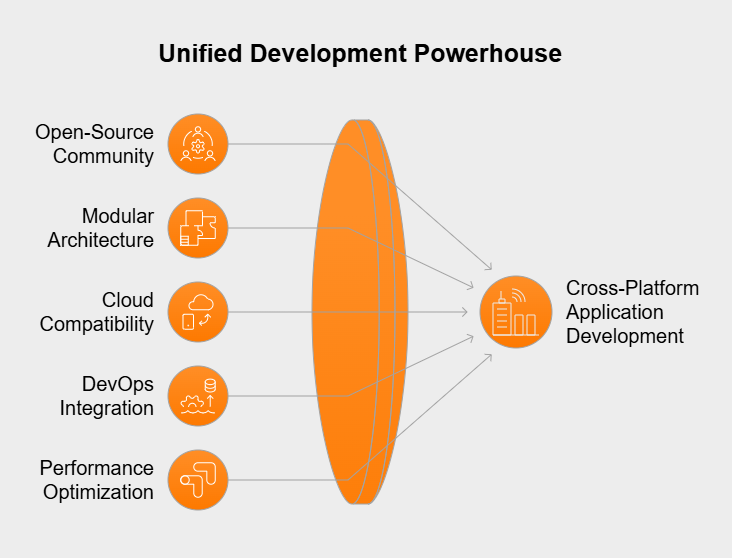
.NET Core empowers developers with a range of application models, making it possible to craft web applications, microservices, and cloud-based solutions. Thanks to its modular design, programmers can incorporate only the necessary components, thereby enhancing performance and optimizing resource use.
A key element of .NET Core is ASP.NET Core, a framework essential for building high-speed web applications and APIs. It embraces the MVC (Model-View-Controller) pattern, which aids in developing well-organized and maintainable web projects. Razor further enhances front-end development by enabling dynamic content generation within HTML templates.
When it comes to database interactions, Entity Framework Core serves as an effective Object-Relational Mapper (ORM). It streamlines data access across various databases by allowing developers to handle them using C# instead of intricate SQL queries.
Dependency injection stands out as a crucial feature in .NET Core that enhances code maintainability through support for loosely coupled architectures. This methodology simplifies unit testing and promotes scalability throughout different projects.
For microservices development, .NET Core offers a lightweight runtime complemented by containerization support via Docker and Kubernetes. These capabilities facilitate seamless deployment on cloud platforms like Azure and AWS while ensuring robust availability.
.NET Core enhances performance through several innovative strategies. Its modular architecture allows developers to incorporate only the components they actually need, minimizing application size and accelerating execution. This efficient approach maximizes resource utilization.
The Just-In-Time (JIT) compilation system further boosts speed by compiling methods on-the-fly during runtime, delivering better performance compared to traditional interpreted languages. Additionally, .NET Core includes the ReadyToRun (R2R) format, which precompiles assemblies ahead of time to cut down on startup delays.
Efficient memory management is another cornerstone of .NET Core’s design. The garbage collector (GC) automatically handles unused objects, reducing memory fragmentation and facilitating faster allocation without compromising application responsiveness.
Furthermore, .NET Core is optimized for modern hardware and cloud environments, leveraging CPU capabilities like SIMD (Single Instruction Multiple Data) to enhance data processing efficiency. These advancements establish it as a robust framework suitable for web applications, microservices, and enterprise solutions alike.
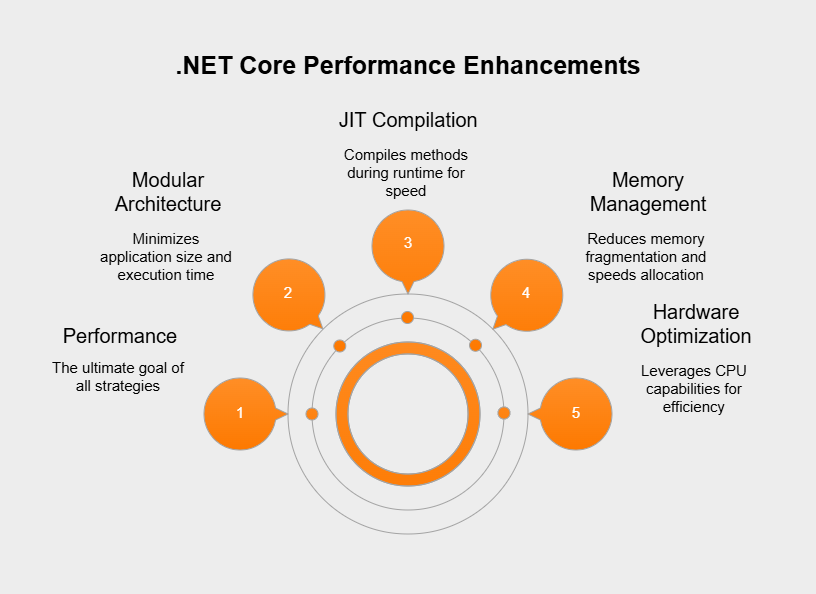
.NET Core and the .NET Framework differ in several key ways. While the .NET Framework is limited to Windows, .NET Core stands out as a cross-platform framework compatible with Windows, macOS, and Linux. This adaptability makes it ideal for diverse environments.
Another advantage of .NET Core is its modular design, allowing developers to incorporate only necessary components. This results in enhanced performance and efficiency. Additionally, being open-source ensures frequent updates and quicker release cycles.
On the other hand, the .NET Framework is known for its stability but lacks the flexibility and modern deployment capabilities that define .NET Core.
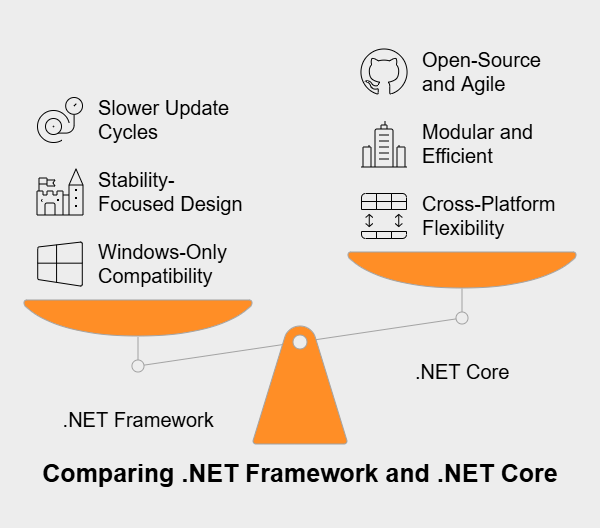
.NET Core has become a go-to option in the realm of modern development. It excels at building scalable systems, microservices, and cloud applications. Thanks to its cross-platform capabilities, developers can deploy software seamlessly on Windows, macOS, and Linux without significant modifications. This adaptability makes it ideal for container environments using Docker and Kubernetes.
Its modular architecture is designed for efficiency. Developers are able to incorporate only the necessary components, which enhances performance while reducing unnecessary bulk. Furthermore, .NET Core integrates effortlessly with cloud services like Azure and AWS, simplifying the deployment of distributed applications.
The framework’s lightweight runtime and support for RESTful APIs make it perfect for microservices architecture. Developers can craft autonomous services that communicate effectively, which improves both scalability and maintenance. With regular updates from Microsoft and backing from an active developer community, the platform stays aligned with industry developments.
.NET Core is developing as part of the unified .NET platform, beginning with .NET 5 and beyond. This unification blends the top features of both .NET Core and the traditional .NET Framework, ensuring compatibility across multiple platforms. The shift enhances performance, increases developer efficiency, and provides superior support for cloud-native applications.
Long-term support (LTS) versions offer stability, allowing enterprises to embrace newer versions without constant migration concerns. Emphasis on cross-platform development means applications can effortlessly operate on Windows, macOS, and Linux.
Looking ahead, future updates are expected to emphasize AI integration, enhanced cloud scalability, and native support for WebAssembly (Blazor). As modern application demands evolve, .NET’s roadmap ensures it remains a preferred choice for developers crafting high-performance solutions.
